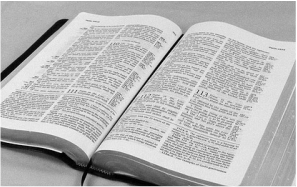Jeremiah Chapter 31 Lessons from the text Back to the Beginning In God's promise of restoration to Israel, He twice refers back to the original promise of the covenant relationship; He will be their God and they will be His people (Jer. 31:1, Jer. 30:22, Lev. 26:12). When God redeems Israel, He does so by bringing them back to the original relationship. Just like Israel, God wishes to redeem all of mankind. He wants to bring us all back into our original relationship with Him. This is found in Genesis 2:8-25 where God and man interacted in the Garden of Eden. There was no need for a mediator for their was no sin; God and man could simply walk and talk together. God wants us to come back to that relationship. He wants to be directly involved in every person's life, watching how we respond to the world that He has made and helping us by giving to us according to our needs. He wants to bless us with the joys of fellowship, companionship, and work. He loves us so much that He gave the life of His Son on Calvary so that we could be restored to this fellowship with Him. Will you let God redeem you? Will you be restored back to your original design? Will you allow God to walk and talk with you, leading you through life's journey? By accepting Jesus Christ as your Redeemer, you can go back to Genesis, go back to the perfect relationship where there is nothing between you and a holy, righteous God. Verse by Verse Commentary 1 God is referring to the time of the complete restoration of Israel (Jer. 30:18-22). 2 While many people died in the wilderness from the rebellion against God, God still provided for them with great care. They were given food and water directly from God, and all their substances were supernaturally preserved against the elements of the desert (Exo. 16:4-18, Num. 20:7-13, Deut. 8:4). 3 Compare with Jeremiah 29:11. God loves His creation and so draws them to Him to give them the opportunity to repent and be saved. 4-5 Just as God drew the Jews out of the world to establish them as a holy nation, He will once again build and establish a kingdom for them (Exo. 19:5-6). Once established, the Jews will again enjoy the blessing of material abundance. 6 This time of restoration will be marked by the time when all the Jews rise up to return to Mount Zion where God is reigning (Isa. 24:23). 7 Since Jeremiah is addressing Israel, this command is for the Jews. Despite their current circumstances, they are to rejoice in what the God will do and pray for its hastening. 8-9 Even though the Jews will return to Zion from all the coasts of the earth, they will predominately come from the north. This could be interpreted as the fleeing from Europe and subsequent establishment of Israel as a nation that happened during WWII. However, verse 6 suggests that God is ruling from Jerusalem at the time, and today there are many Jews still living in the nations of the world. Therefore, a better interpretation is that this verse has begun to be fulfilled by the establishment of the Jewish nation in 1948 but will not be completely fulfilled until Christ comes and a second great wave of Jews return to the Holy Land. Noteworthy is that those who need healing and protection, whether Jew or Gentile, will come to Jerusalem. 10 Ephraim is Joseph’s second-born son yet is blessed as the first-born (Gen. 48:17-20). He and his brother, Manasseh, took the place of Jacob’s first-born, Rueben, because of Rueben’s sin against his father (Gen. 35:22, Gen. 49:3-4, 1 Chro. 5:1). God honors this rebuke by Jacob in that He does not give Rueben any inheritance in the land of Canaan but instead allots lands to Ephraim and Manasseh. In the end times, Ephraim will be one calling all Jews to return to Jerusalem, which is Zion (v.6). Perhaps because of the sorrowful condition of the remnant, God will lead them with supplications. Webster defines supplications as “to ask for earnestly and humbly.” “Rivers of water” symbolizes sustenance and refreshment, and “in a straight way” symbolizes the most direct and upright way. 11 Israel is considered weaker than the other nations. This can be understand by considering the ratio of lost to redeemed people; those who accept and follow God have always been the minority pitted against a world of people who despise the works of God and who therefore despise God’s people. 12 Being delivered from enemies stronger than themselves, God’s people will rejoice mightily when they finally take up residence in Zion. The presence of wheat means that the people’s physical needs will be met; the presence of wine that there will be cause for rejoicing; oil to symbolize light and the presence of the Spirit of God; and the young of the flock to imply that the weakest and most vulnerable will flourish under God’s protection. 13 God promises to replace the sorrow of His people with joy. In this life the believer experiences hardships and sometimes persecutions for his faith, but God will honor the believer's faith when he enters into rest in God's presence. Paul writes that "the sufferings of this present time are not worthy to be compared with the glory which shall be revealed in us" (Rom. 8:18). 14 God will bring about spiritual "fatness." One is fat when one continually consumes more than one needs as well as retains that which one has consumed. Spiritually, then, this means continually, rather than sparingly, receiving God's goodness and His Spirit and then retaining and being satisfied with what one has received. 15-17 The Lord opens a new prophecy. Matthew states that this refers to the slaughter of the children two years old and younger by King Herod (Mt. 2:16-18). God tells the mothers to not weep because their hardship is something they must go through to accomplish a work for God. While grief in this life may be excruciating, it is only temporary; the believer's end is everlasting joy in the kingdom of God. This prophecy is also tying back into the original topic, which is the Jews’ complete restoration. 18-19 After all that the Jews will go through, Ephraim will humble himself and cry out to God. He will demonstrate the repentant man; accepting chasticement from God for his sins, he will submit to the rule of God in his life. 20 God will hear and be moved by the repentant cry. Even when He is speaking against Ephraim in judgment, God still remembers that he is His first-born and beloved son of Israel. God is troubled that Ephraim has to endure such affliction and is eager to cease judgment against him. 21 God tells the Jews to turn around and walk back the way they came. The point is to undo what they have done and return to their original path, the highway of righteousness. They are to set up waymarks and heaps to clearly mark the way that they should go. 22 God wonders how long Israel will continue to drift farther and farther away from Him. While certain Jews, such as the tribe of Ephraim, will repent and turn their hearts back to God, others will continue to slip backwards into sin. God gives one final plea to try to call them back to a right relationship with Him: He will create a new sign. While there are different opinions on this verse, the context points to a Messianic prophecy; from within Israel and within its cities, a man will come. Since this appearing will be a new thing, it is rightfully understood as the virgin birth of Christ, as never before was a man born of a woman without a human father. To “compass” simply means to surround, and in this instance indicates the man in the womb. 23-25 When the Jews return to the promised land, they will praise and bless the land, recognizing it as the place of justice and holiness. These are attributes they have not hitherto acknowledged, considering that they have continued to shed innocent blood and defile the land with idol worship. This time will be marked by farmers and herders. In addition to God satisfying their souls, they will flourish by the abundance of the land and livestock 26 Jeremiah now “awakes” from the vision. Since previous visions have come while he is awake, this may simply refer to the vision itself being sweet. On the other hand, this could equally have been a vision received in a dream. God is not limited to the means by which He reveals Himself to His prophets. 27-30 Opening a new message, God repeats the imagery of the previous vision, stating that both man and beast will flourish (v. 24). People will not say that they have inherited a sour fate or wait on edge to pay the price for their parents' sins because each person will be accountable for his own sins; individuals, not the nation as a whole, will be punished for their sins. 31-34 God promises a new type of covenant to Israel. The first covenant, the written law, is an external covenant; the laws are engraved in stone for everyone to read and learn about (Exo. 34:27-28). This new covenant, however, will be in an internal one; the knowledge of God will be written in the person's heart and mind. This is rightly understood as the indwelling of the Holy Ghost who teaches believers of the Godhead (Jn. 14:26). Also, under this new covenant sin will be forgiven. Under the covenant of the law, the punishment for sin is delayed for one year by the animal sacrifice (Exo. 30:10). Christ's sacrifice, however, completely erases one of one's sin so that it is never brought up in accusation against one again. 35-37 On the basis of God’s authority over creation, Israel will never cease from being a nation. Just as it is impossible for man to measure the heaven above and the depth of the earth, so too is it impossible for Israel to be totally cast away from God. 38-40 When Israel is restored under the Lord’s guidance, Jerusalem will have a larger footprint than its current one, and the entire city will be called “holiness to the Lord” (Zech. 14:20-21). See Nehemiah 3:1, 12:39, for the rebuilt tower of Hananeel. Gareb and Goath are both hills near Jerusalem, and Goath is most likely the same as Golgatha. Kidron is to the east of the city. ___________________ Thank you for your faithfulness in studying God’s word. Please comment below to share what you learned from today's lesson.
0 Comments
Leave a Reply. |
Devotional Categories
All
Archives
September 2023
|
|
Join my mailing list!
|
Thank you!You have successfully joined our subscriber list. |
|
© 2024 Melissa Beaty
|
